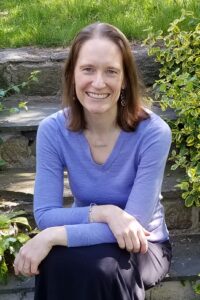 Dr. Amy L. Freestone, Principal Investigator
Dr. Amy L. Freestone, Principal Investigator
Dr. Freestone completed her PhD in Ecology at the University of California, Davis, exploring local and regional drivers of terrestrial plant species diversity. As a postdoctoral fellow at the Smithsonian Institution, she expanded the geographic scope of her research to a continental scale, and shifted her primary study system to the nearshore marine environment. She maintains active research in both marine and terrestrial ecosystems.
Dr. Freestone conducts field work in nearshore marine ecosystems on both the Atlantic and Pacific Coasts of North and Central America, and has collaborative projects that span other continents. She is a community ecologist by training, but she uses comparative approaches to understand natural systems across continental and global scales. Her research directions are driven strongly by an intellectual curiosity in the biodiversity of nature and a personal commitment to informing conservation science. Her research has been funded by the National Science Foundation and the Smithsonian Institution. She is also a Research Associate at the Smithsonian Environmental Research Center in Maryland and the Smithsonian Tropical Research Institute in Panama.
Dr. Freestone is the director of the Temple Ambler Field Station as well as the Ecology, Evolution and Biodiversity (EEB) Bachelor of Science degree program offered through the Department of Biology.
She is on the editorial board of Ecological Monographs and is guest editing an upcoming volume of Annual Review of Ecology, Evolution, and Systematics as well as an upcoming special issue on Experimental Macroecology in Ecography.
Email: amy (dot) freestone (at) temple (dot) edu
Note for undergraduates: We usually have several undergraduate researchers assisting us each semester. If this is something that interests you, there are several ways to get involved. You can apply to CST’s Undergraduate Research Program, you can register for a research course to earn credit, or you can just volunteer! If you are interested in joining the lab, please email Dr. Freestone with a brief description of your background, interests and why you want to get involved.
Note for prospective graduate students: If you are interested in joining the lab as an MS or PhD student, please email Dr. Freestone (1) a description of your background, research interests, and why you think the lab is a good match for your graduate training, and (2) your current CV.
Current Lab Members:
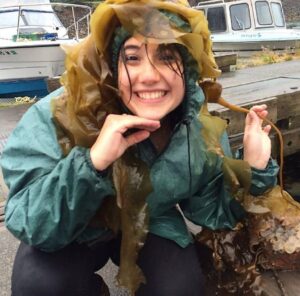 Dr. Mariana Bonfim, Assistant Professor of Research
Dr. Mariana Bonfim, Assistant Professor of Research
Mariana joined the lab in Fall 2015 to focus on processes varying with latitude such as recruitment niches, community resilience, and invasion resistance in coastal marine invertebrates. She graduated in 2021 and is currently the Assistant Director of the Temple Ambler Field Station, where the research program includes a focus on understanding the resilience of temperate deciduous forest ecosystems to large-scale climate-driven disturbances, such as tornados. Her past research includes identifying organisms in ballast water of docked ships in northeastern Brazil, where she is originally from.Website: https://sites.temple.edu/mbonfim/
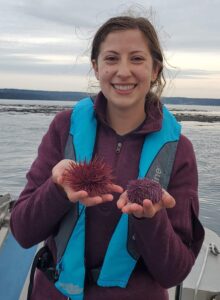 Mary Cortese, PhD Candidate
Mary Cortese, PhD Candidate
Mary joined the lab in Fall 2019, and her major interests are centered around understanding species ranges and the impacts of range movement on community composition and ecosystem function. She is also particularly interested in species interactions and understanding the impact of changing temperatures on species interactions across latitudes. Her work is cross-disciplinary – she also works in terrestrial forest systems looking at patterns of global change and the impacts of disturbance on system recovery. Mary is a Graduate Research Assistant at Temple Ambler Field Station.
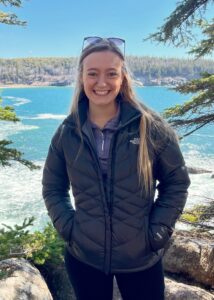 Katherine Stevenson, Masters Student
Katherine Stevenson, Masters Student
Katie joined the lab in Fall 2022 with an interest in studying marine invasions and their impacts on native ecosystems. Specifically, she is interested in studying the mechanisms that drive successful invasions and the ecological impacts of invasive species on marine communities. Her current project focuses on how species interactions, such as predation and competition, impact marine invasions across the global gradient of latitude. Katie is a Graduate Research Assistant at Temple Ambler Field Station.
Website: https://sites.temple.edu/stevensonk
Recent Graduates:
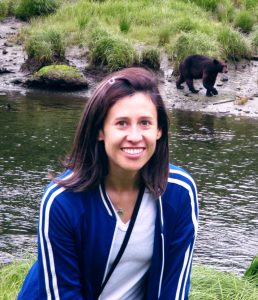 Diana Lopez, NSF Postdoctoral Fellow
Diana Lopez, NSF Postdoctoral Fellow
Diana joined the lab in the Fall 2015, and her major interests are to explore a latitudinal gradient of functional diversity and the effect of predation on trait distributions across latitudes to infer different community assembly processes and the potential for biotic resistance to invasions. Her prior research, conducted during her masters degree, looked at behavioral and life-history traits that may have contributed to the rapid range expansion of an invasive fish in the Everglades. Diana graduated with her PhD in 2020 and is now an NSF postdoctoral fellow with the Smithsonian Tropical Research Institute and Florida State University.
Website: http://dianaplopez.weebly.com/
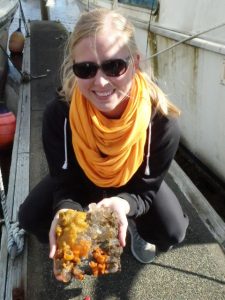 Michele Repetto, Smithsonian Postdoctoral Fellow
Michele Repetto, Smithsonian Postdoctoral Fellow
Michele joined the lab in Fall of 2015 and has a number of interests based in community ecology, with a focus on marine systems. She is particularly interested in species interactions (predation, competition, parasitism) and anthropogenic threats to biodiversity, such as the introduction of non-native species. Her doctoral research aimed to understand biogeographic patterns of competition and predation as well as factors influencing these interactions through space and time. Michele graduated with her PhD in 2021 and is a postdoctoral fellow with the Smithsonian Environmental Research Center and Moss Landing Marine Laboratories.
Website: https://sites.temple.edu/repettom/